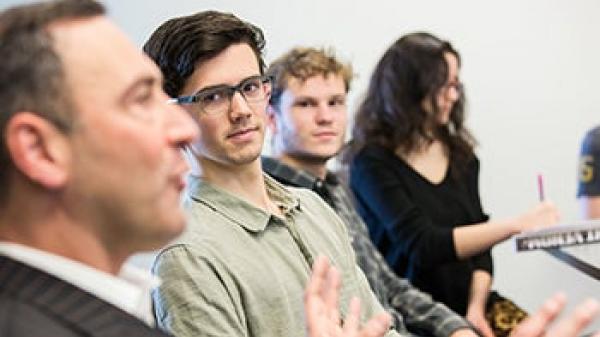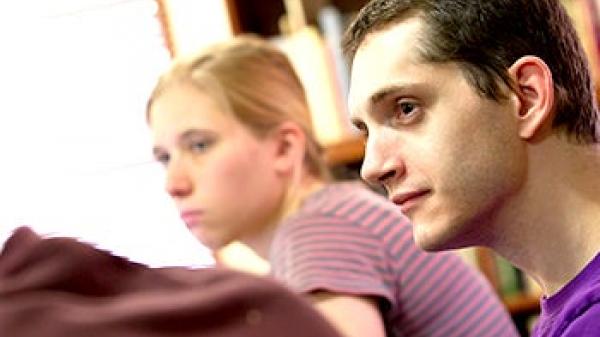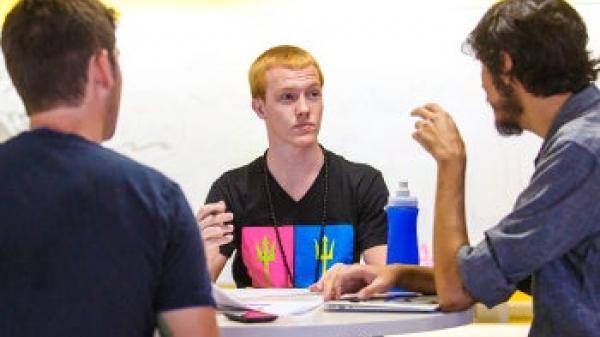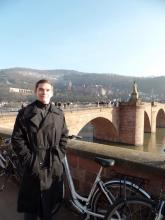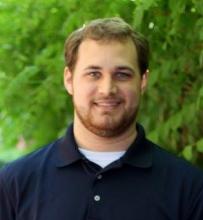Studying German at ASU
Discover what German courses at ASU have to offer you and how becoming proficient in German language and culture can open doors for you, in your community and abroad.
Overview
Our programs in German
When you study German, you will discover cultural, economic, and intellectual opportunities to help you succeed and innovate in our increasingly global and international world. With an estimated 100 million native speakers across Germany, Austria, and Switzerland, German is the most widely spoken first language in the European Union. As you expand your German language skills, you will also begin to deepen your understanding of German influence in all parts of the world.
In the German program, you will study areas such as:
- linguistics, literary and cultural studies, film, theatre, and performance
- multiculturalism and intercultural competence
- the interconnections between language, culture, history, politics, and socioeconomics
- the art, architecture, and art movements of 19th and 20th-century Germany
- the writings and thoughts of figures like Goethe, Schiller, Keller, Kafka, Rilke, Aichinger, Bachmann, Wolf, and others
- German representations of the Holocaust and responses to the Third Reich
- Germans continuing impact on world affairs and diplomacy in Africa and the Middle East
In the past, students have enjoyed these areas and found them to be very engaging and rewarding. They have also appreciated the attention they received from our faculty, who aid students in their intellectual development. This program also allows for some flexibility and individual needs.
But what about career prospects? With an estimated 100 million native speakers, it is one of the world's major languages and the most widely spoken first language in the European Union, making German applicable to virtually any job. For example:
- national and international business
- international law and legal studies
- high school, community college, and university teaching
- Non-governmental organizations, philanthropy, and the non-profit sectors
- sustainability and environmental organizations
- diplomacy, humanitarianism, and social justice organizations
- science, technology, engineering, and health science fields
- music and the performing arts
- or you can pursue a graduate degree
Even in careers where German is not directly applicable, employers have come to value multi-lingual trained college graduates for their ability to see things from a different perspective, provide great insight into other cultures, think critically about issues, and solve problems innovatively and successfully.
Many students combine their study of German with another discipline. German makes a good combination with majors or minors in:
- pre-law and pre-med
- sustainability
- engineering and computer science
- natural sciences (life sciences, molecular sciences, psychology, physics, earth and space exploration)
- history, philosophy, and religious studies
- international politics and global studies
- business and economics
- arts, music, and the performing arts
- education
Our faculty and staff can help you reach your personal and educational goals. Contact our SILC advisors to declare a major, minor, or graduate program!
Don't forget to visit the German Program for the latest information on events, study abroad opportunities, and available courses.
Degrees
BA German
Whether you want to learn about the long tradition of medieval courts, are intrigued by Germans' success in the business world or are imagining a career in the natural sciences, performing arts, sustainability or the humanities, a major in German helps you translate the world from a new perspective.
German, MA
Deepen your understanding of German linguistic, literary and cultural studies and broaden your knowledge of Germany as one of the world's leading economies, cultural contributors and human rights advocates.
German (Minor)
Add a German minor to your degree program and watch as the opportunities and points of connection to other parts of the globe take you in directions you never thought possible. Whether you're interested in engineering, science, health, sustainability, global business or art, you'll see immediate benefits from studying German.
Learn more
Outreach Programs
German Devils is a student-run organization with the goal of promoting the German language and culture at ASU. Typical events throughout the school year include Stammtisch (casual meet-up at a local restaurant/pub for conversation and fun), German film night, and monthly meetings. Please check our calendar for upcoming events or go to our Facebook Page for updates. Please feel free to contact the ASU German Club officers at any time with questions, suggestions etc!
The SILC Attaches Club is a club that brings all languages and cultures from SILC together. People are able to learn about different cultures in a fun way when studying a language. Understanding different cultures is such an important attribute to have, and it is one you can obtain through SILC Attaches. This club creates community events, outreach projects, and plans fun get-togethers.
Regensburg, Germany
-
A faculty-guided summer study abroad program
-
Visit Regensburg, a UNESCO Heritage site and learn about its rich history and culture.
-
6 Credits
-
For more info visit the Regensburg Study Abroad Brochure or check out the ASU Regensburg Study Abroad Facebook Page.
-
For more info on WHY you should study abroad.
Berlin, Germany
-
TBA
-
Real-world practice in working with NGOs and immigrant/refugee communities
-
Visits to Berlin Wall, Holocaust Memorial, Parliament, The German Resistance Memorial, Berlin’s Turkish market
-
Meet politicians, representatives of the media and NGOs and directly engage with migrants
-
Class and cultural visits in English
-
Potential to earn Internship Credit
-
Open to students 2.5 GPA, exceptions could be made on a case by case basis
-
For more info visit the Berlin Study Abroad Brochure!
-
See what ASU Now has to say about the program!
Check out our study abroad trips in SILC.
The ability to speak another language opens up more opportunities for scholarships and fellowships. Take a look at our SILC scholarships. ASU also offers an extensive database for you to search through and find the right ones to apply for.
In the Study Abroad Office, Shira Burns oversees applications to programs. Study Abroad’s deadlines for applying for all programs are September 25th for the spring and February 15th for the fall. ASU financial aid is accepted for all programs on Study Abroad’s approved list.
Here is a list of a few scholarships specific for language:
- Fulbright
- Boren
- Benjamin A Gilman International Scholarship
- USAC Study Abroad Scholarship
- Stohl International Undergraduate Research Scholarships
Fellowships and Internships
- U.S. Department of State has a student internships program through Pathways.
- Thomas Perking Undergraduate and Graduate Foreign Affairs Fellowship
- European Union Internships in Europe.
- European Union Internship in the United States.
- Cultural Ambassador Program
People
Faculty
Affiliated Faculty
Alumni Stories
Name: John Harkness
Graduation year 2016
Major History
Minor German
What's your current job?
I am currently serving for a year in the AmeriCorps VISTA (volunteers in service to America) program with the Arizona Refugee Resettlement Program. My title is public benefits analyst, and I collect and analyze data about how Refugees use public benefits in order to strengthen the capacity of the Refugee Resettlement Program, other state departments, and the resettlement agencies to share information with each other about how Refugees are using programs such as cash and medical assistance and employment services.
How does language and culture help you succeed in your career?
Studying language and culture, along with my major in history (shoutout to SHPRS), helped me develop a greater capacity for empathy. By studying others’ experiences, I am able to see new perspectives. In my current position, this helps me interpret the data I collect by recognizing that these refugees come from very different cultures and some very horrific situations, and therefore I can try to identify with their challenges.
In terms of a career, I want to go into international affairs, where starting with at least one foreign language is crucial.
Did you study abroad? If so, can you speak about your experience?
I spent 7 months in Germany in 2015, first as an intern with the US State Department in Frankfurt and then I did a study abroad semester in Munich. It was one of the best experiences of my life. I met and became friends with people of all different backgrounds and experiences. As an intern, one of my duties was to give presentations to German high school English classes about American politics and culture, and it was really special being able to talk to the kids about their perceptions and experiences of America while sharing my own point of view. In Munich, I was the only American exchange student at my university, so I became friends with students from all over the world, from India and Pakistan, to Italy and Finland, to Canada and Brazil. Studying abroad was always a goal of mine, and being able to live in a different culture was amazing.
How did ASU and the language program at SILC prepare you for your future?
As I said before, I want to go into international affairs, where language skills are very important. But also, while in college, I was able to do the majority of the research for my honors thesis in German. I think that showcased a skill of mine that will (hopefully) be valuable when applying to graduate school and jobs.
What was your favorite thing about learning a language?
My favorite thing was when I was in Germany, I was able to (mostly) communicate. Getting through a conversation, or even asking a question at the store was really satisfying. It wasn’t a conclusion to learning German, of course, but it just showed how much progress I had made on this skill.
Name: Samuel McClernon
Graduation year 2016
Major German
Minor Economics; Political Science
What's your current job?
I currently work as an Education Specialist at Global Launch (ASU) and a Graduate Writing Consultant at the Writing Center (UASP, ASU). I am in my first year of the MTESOL program at ASU.
How does language and culture help you succeed in your career?
Applying the principles that I learned from the languages and cultures that I have studied has greatly benefited me in my career choices. While influencing my decision to pursue an MTESOL degree, language and culture have also greatly aided me as a writing tutor in communicating effectively with both international and native-English students. At every turn of both my academic and professional careers, I find myself drawing on the concepts that I was able to both learn and experience throughout my undergraduate years.
Did you study abroad? If so, can you speak about your experience?
I had the opportunity to study for a semester at the University of Tübingen in Germany. The experience not only improved my confidence in my speaking skills in German, but I also came to better understand how to communicate interculturally. From my time abroad, I was able to further my educational experience upon returning, bringing a new perspective to classes. In the end, studying abroad became a large factor influencing my future career choice to pursue an MTESOL degree. While I certainly have no doubt that I would have been successful without studying abroad, there is no question that the path I have taken is shaped in many ways by this experience.
How did ASU and the language program at SILC prepare you for your future?
Through the courses I was able to take throughout my time as an undergraduate at ASU, I was able to develop many skills, including communication, intercultural communication, and critical analysis. In addition, ASU and SILC prepared me to pursue my goals and maintain the drive to succeed.
What was your favorite thing about learning a language?
There are too many things about learning a language that I could say are my favorite to really narrow it down to just one. However, some of these things include learning about the culture that is connected to that language; overcoming hurdles in developing listening, speaking, writing, and reading skills; and becoming proficient enough to communicate with native speakers of another language.
Name Amila Becirbegovic
Graduation year May 2010 (MA) May 2008 (BA)
Major German MA, German BA
Minor Justice Studies
What's your current job?
I am a PhD Candidate and German Instructor at the University of California, Davis. I teach beginning and intermediate German language courses, as well as upper-division German, Film and Human Rights content courses, from post-WWII German writers to contemporary genocides and Holocaust representations. I am currently finishing my dissertation, Mediated Memory: Visual Culture and Prosthetic (Re)Memory in Post-War Germany, which examines how contemporary generations remember the Holocaust through literature, comics and film and what impact popular visual remediation of the Holocaust has on current genocides and the refugee crisis.
How does language and culture help you succeed in your career?
In the German language courses that I teach I am able to access authentic German material, which is extremely beneficial and a skill that I can transfer to my students by bringing the German language and culture alive through authentic texts. Likewise, in my upper-division content courses, I am better able to explain difficult topics and concepts because these ideas and histories are available to me as original sources in German, which authenticate my research and the content that I teach.
Did you study abroad? If so, can you speak about your experience?
I am originally from Europe and was born in Bosnia. After the onset of the Bosnian war, and as a consequence of the ensuing genocide, I was a refugee in Hannover, Germany from 1992-2000, before moving to Tempe, Arizona. I started my undergraduate and graduate studies at ASU, with a focus on Holocaust memory and a minor in Justice Studies. While I did not have the traditional study abroad experience, I certainly taught many German students at ASU who took advantage of the many wonderful study abroad opportunities and the exchange program with Regensburg, Germany. Many of my colleagues at ASU were also fellow instructors from Regensburg. The exchange program allowed for a more diverse representation of Germany, by introducing undergraduates and graduate students alike to students from southern Germany and showcased their experiences and expertise.
How did ASU and the language program at SILC prepare you for your future?
I always knew that I wanted to teach and the German program at ASU provided me with the opportunity to start my German teaching career. I was able to instruct various lower and intermediate division German language, grammar and culture courses. This was a truly unique educational experience and I greatly benefitted from being able to stand in the classroom as an independent instructor so early in my career. In addition to teaching German at ASU, I was also able to partake in many cultural activities on campus, from the weekly Stammtisch meetings to German club events and the annual High School German language contest. The ASU German program instilled within me a sense of community and an appreciation for teaching German courses to undergraduates. I have now been teaching for over a decade and many of the pedagogical techniques and strategies that I acquired at ASU are still with me and accompany me into every new classroom and institution.
What was your favorite thing about learning a language?
Since I was already a German heritage speaker upon arriving at ASU I wasn’t necessarily looking for formal language training. However, I was pleasantly surprised by the depth and value of the courses that I took and how much they added to my existing language foundation. In particular, Dr. Daniel Gilfillan’s upper-division special topics courses, which were not only educational and rich in subject matter, but his passion for German history, visual and contemporary culture and the individualized attention and feedback that he invested in each student really motivated me to pursue German as a career. Besides the courses, which resulted in a lifelong friendship with my fellow peers and even with the instructors, I benefitted immensely from the ASU community at SILC. The interdisciplinary nature of each program was extremely beneficial and fostered a collaborative atmosphere, where students could take classes from SILC faculty on various interdisciplinary subjects and be surrounded by many different languages, cultures and histories.

